|
|
Post by coke & comics on Jan 23, 2016 14:48:28 GMT -5
"A promise in the snow" Usagi Yojimbo #8 (December, 1996) Reprinted in Usagi Yojimbo Book 11: Seasons  Summary: Miyamoto Usagi Summary: Miyamoto Usagi wanders through a snowy mountain following a shortcut suggested by Gen. He finds a man (well, pig) dying from bandits who asks Usagi to save Merchant Araki. Usagi comes across another servant of Araki fighting off bandits. Araki himself is badly wounded in the fight. And Usagi dispatches the bandits. Araki Fumiye, daughter of the merchant is there, and begs Usagi to promise to save her father. He does. Fumiye leads him to their village, explaining her father had traveled this route on a pilgrimage to the temples. Through avalanches, steep cliffs and wild tokage, Usagi makes is able to get Araki safely home and keep his promise. Thoughts: I paused the summary as there is a bit of a twist to come (though not a surprising one). The story of someone heroically carrying another through snow seems a common trope. I know I've seen a similar story in Batman comics, for example. Down to the precise image of a wounded person on a sled being dragged. I wonder what it dates back to. Jack London, perhaps? Or older? The strength of the issue lies in the depiction of Usagi's struggle against nature, masterfully told as expected. In every panel. you are able to feel Usagi's pain and struggle to keep a perhaps-impossible promise. 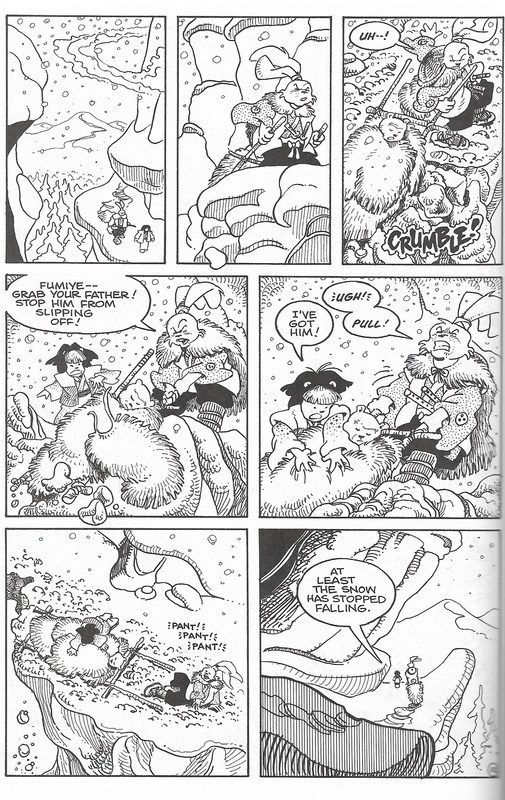 I can't figure out that the reference to Gen's shortcut points to anything. They have argued about Gen's shortcuts in the past. I am not certain of what context Gen suggested Usagi take this particular mountain pass. We last saw Gen in issue 13 of the Mirage series, and I can find no reference to the shortcut of the issue. I can't tell if Sakai is hinting at an untold meeting with Gen or merely an unseen conversation from their last meeting. |
|
shaxper
CCF Site Custodian
Posts: 22,864
|
Post by shaxper on Jan 23, 2016 22:39:33 GMT -5
The strength of the issue lies in the depiction of Usagi's struggle against nature, masterfully told as expected. I'm really disappointed that this is all you got out of it. Are you avoiding discussing the ending for spoiler reasons, or did it just not resonate with you? I was also very impressed with Fumiye's characterization. She felt so very real to me in both her dialogue and in the motions and facial expressions Sakai lent to her. Usagi has encountered many children in his wandering, but Fumiye resonated with me more than the others, even before the ending. He gave her a lot more range and depth in this one little story. |
|
|
|
Post by coke & comics on Jan 24, 2016 2:55:29 GMT -5
The strength of the issue lies in the depiction of Usagi's struggle against nature, masterfully told as expected. I'm really disappointed that this is all you got out of it. Are you avoiding discussing the ending for spoiler reasons, or did it just not resonate with you? I was also very impressed with Fumiye's characterization. She felt so very real to me in both her dialogue and in the motions and facial expressions Sakai lent to her. Usagi has encountered many children in his wandering, but Fumiye resonated with me more than the others, even before the ending. He gave her a lot more range and depth in this one little story. While I'm not too concerned about spoilers of a 20 year old story, I have been avoiding a couple obvious ones. I think the comic has a fine ending. But it's also true that I seem to love this story much less than you. I like the character of Fumiye, but am most interested in what I pointed to, the effect the promise has on Usagi, and his triumph over adversity. I certainly think this is a good issue for all the reasons you mentioned. But it doesn't resonate me the same way the previous issue did, or that the next one will. |
|
|
|
Post by wildfire2099 on Jan 24, 2016 14:45:52 GMT -5
Huh... yeah, I think 'A promise in the snow' is pretty much the best single issue comic ever. Maybe you have to have a daughter to appreciate it? Or maybe me and Shax are just too emotional?  |
|
shaxper
CCF Site Custodian
Posts: 22,864
|
Post by shaxper on Jan 24, 2016 14:48:28 GMT -5
Huh... yeah, I think 'A promise in the snow' is pretty much the best single issue comic ever. Maybe you have to have a daughter to appreciate it? Or maybe me and Shax are just too emotional?  I loved the heck out of it long before I had a daughter, but yeah to the last part. You've got to love having a good cry to really appreciate that one. |
|
|
|
Post by coke & comics on Jan 24, 2016 16:37:46 GMT -5
Huh... yeah, I think 'A promise in the snow' is pretty much the best single issue comic ever. Maybe you have to have a daughter to appreciate it? Or maybe me and Shax are just too emotional? ;) I definitely appreciate the issue less than the two of you. Though I do think it's both a good issue and good ending. There is an Usagi comic I cite as one of the best single issue comics ever, but we have not reached it yet. And also an Usagi story I cite as one of the best multi-issue comic book arcs ever, and we're almost there... |
|
shaxper
CCF Site Custodian
Posts: 22,864
|
Post by shaxper on Jan 24, 2016 16:47:08 GMT -5
There is an Usagi comic I cite as one of the best single issue comics ever, but we have not reached it yet. Screw spoiler alerts  Mine is "Chanoyu" (Usagi #93). "Promise in the Snow" might be my #2, though. If you mean "Grasscutter," I look forward to an extended debate on why I feel it's both quality and overrated. I love the prologues though. For me, the Top 3 are: 1. Grasscutter II 2. The Dragon Bellows Conspiracy 3. Grey Shadows (there is not a sustained plot across the issues, but it does function as one complete volume with supporting characters and themes running throughout) |
|
|
|
Post by coke & comics on Jan 24, 2016 17:22:17 GMT -5
"The conspiracy of eight" Usagi Yojimbo #9 (January, 1997) Reprinted in Usagi Yojimbo Book 11: Seasons  Summary: Summary: Unaffiliated assassins ambush a group of Lord Hikiji's samurai. One escapes and falls wounded at Priest Sanshobo's temple, where Miyamoto Usagi is a guest. 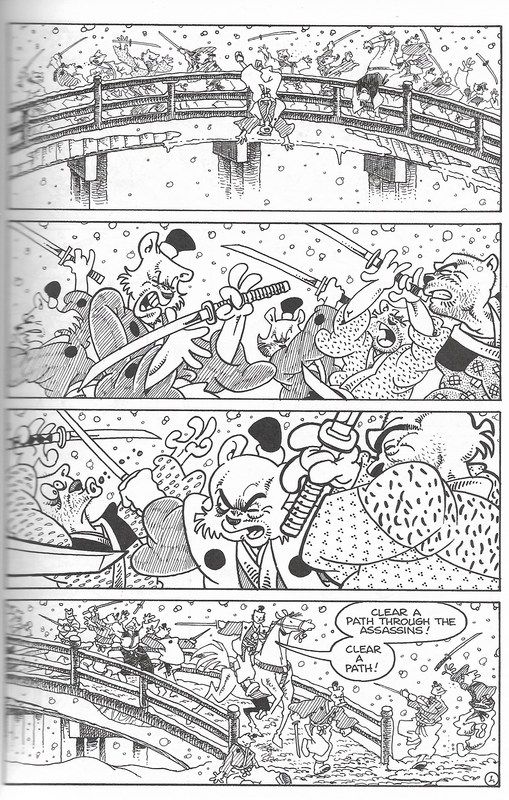 Sanshobo speaks of Lady Komachi and hints and romance, which Usagi dismisses with blush. 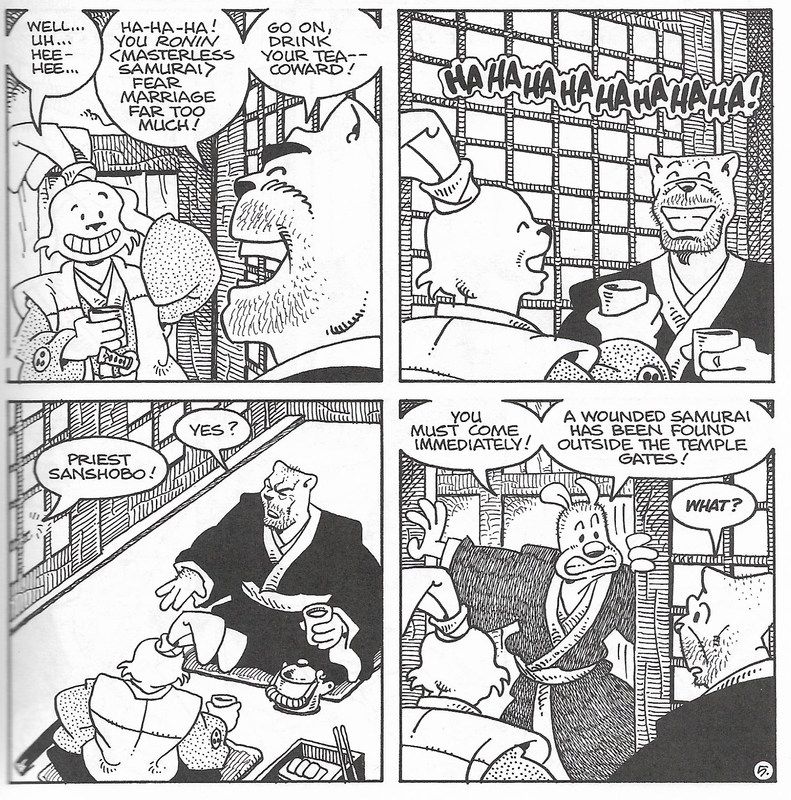 The unconscious vassal carried a document with names signed in blood, telling of a conspiracy of eight lords against the shogunate, seeking to restore the emperor. Usagi suggests giving the document to Lord Noriyuki, but Sanshobo notes that would condemn the conspirators. The assassins approach the temple, demanding the release of the vassal. Sanshobo and Usagi fight them off, while Jiro guards the courier. They let the assassins escape, but begin fortifying for a siege. The samurai return with a battering ram, but slip on a trap of ice prepared for them. In the confusion, one slips through, kills Jiro and Hikiji's courier and steals the document. He is Kagemaru of the Neko Ninja. He delivers the document to their chieftan, Chizu. Thoughts: I'm a little confused as to what Usagi is doing there. He had been in the area of Sanshobo's temple and then was seen clearly going somewhere. He was cutting across a mountain and alleged the journey would take several weeks. Yet now we find him back at Sanshobo's temple. Perhaps "A Promise in the Snow" is meant to fit elsewhere in continuity. Perhaps Usagi finished his business and returned? Or perhaps I'm just confused about geography. Sanshobo questions why Usagi shows such an interest in the affairs of aristocracy when he is a mendicant. It's a fair question. His dislike of Hikiji obviously dates back to the death of Lord Mifune, is bolstered by his friendship with Noriyuki and reinforced by the number of times he has come across Hikiji engaging in nefarious deeds. Sanshobo's question could be reflected on himself. Both he and Usagi have removed themselves from the affairs of politics, but maintain an interest, brought to a boil in this issue. Usagi has clear loyalties to the Shogun and a distaste for those he calls traitors. Sanshobo seems sympathetic to their cause, but quickly remembers that his place is to be a priest. 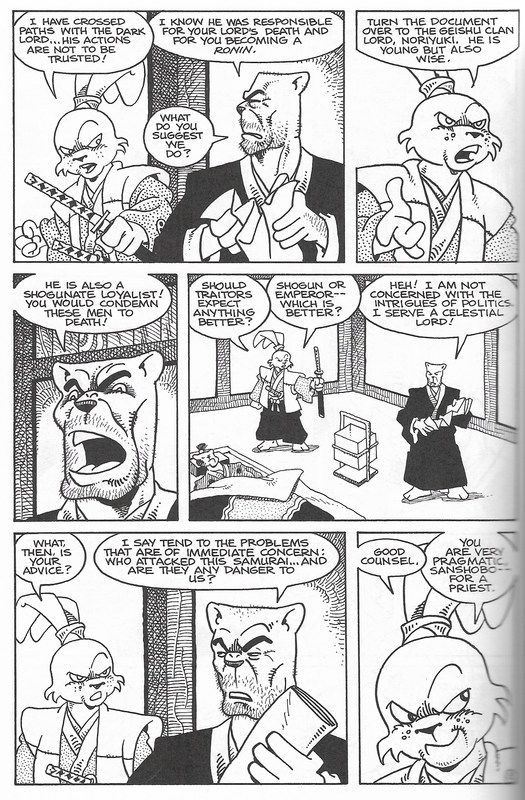 Usagi would have killed the attackers. Sanshobo insisted they be allowed to leave. It's easy to think of Usagi as a very kind, moral, and relatable person. But in truth he leaves a large body count behind him. We've seen him kill hundreds with no remorse. He is a warrior. Sanshobo is not so bloodthirsty. This story is full of intrigue. Plots within plots. The conspirators, Hikiji, the Neko Ninja, Noriyuki, the Shogun, all with their own agendas. With Usagi and Sanshobo caught in the middle, uncertain where their loyalties do, or should, lie. But the time is coming to make a choice. In many ways, this harkens back to the earliest Usagi stories from Albedo and the first special. A courier with a document pointing to similar intrigue. Sakai wisely backed off those old stories. He was not yet the storyteller he is now and was too fast narrowing Usagi's world, when it first needed expanding. Now that we know who Usagi is, and have a vast world of colorful characters, each given their room to breathe, it is a better time for the intrigue of the first stories. The moral and political debates between Usagi and Sanshobo are compelling. The intrigue is thrilling. And the tension is clear. It is obvious we will hear from this conspiracy of eight again. Sanshobo's arc in this issue is truly excellent. Torn between priest and general, as his two worlds collide. He has to struggle to remember who he is now, and question whether his old instincts are still the right ones. He is very quick to insist the document not be turned over to Noriyuki and to start leading his priests as an army against a siege. But also introspective enough to question what is right. He risks the lives of his priests and the safety of his temple. Why? For politics? For the emperor or shogun? Or to protect a single sick man in his care. 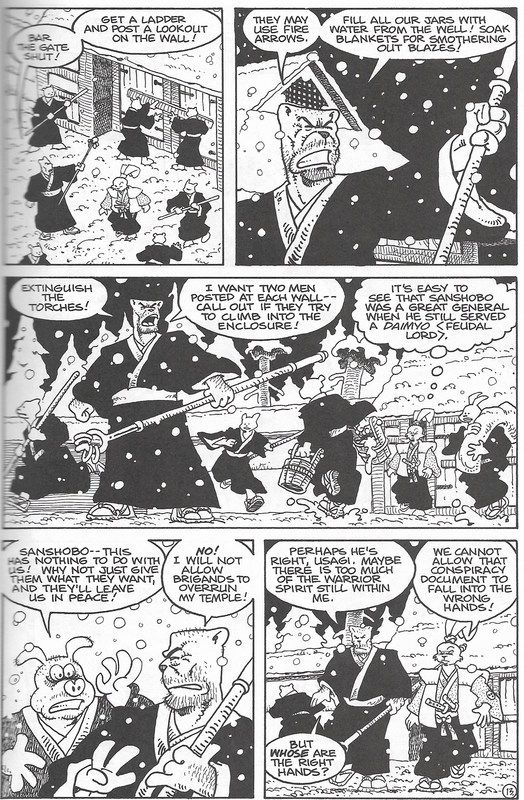 And though we see her only briefly, the scene with Chizu is excellent, and speaks to why she's a great character. One of the villains in Usagi's life, but a villain Usagi generally finds himself allied with, and who has a clear attraction to Usagi. She is much more his Catwoman than Kitsune. As chief of a ninja clan, she is and must be ruthless. Except for her soft spot for Usagi. She finds pretense to let him live, because she cares about him. In the final panel, she hopes he does not get involved. She does not want to choose between him and her clan. 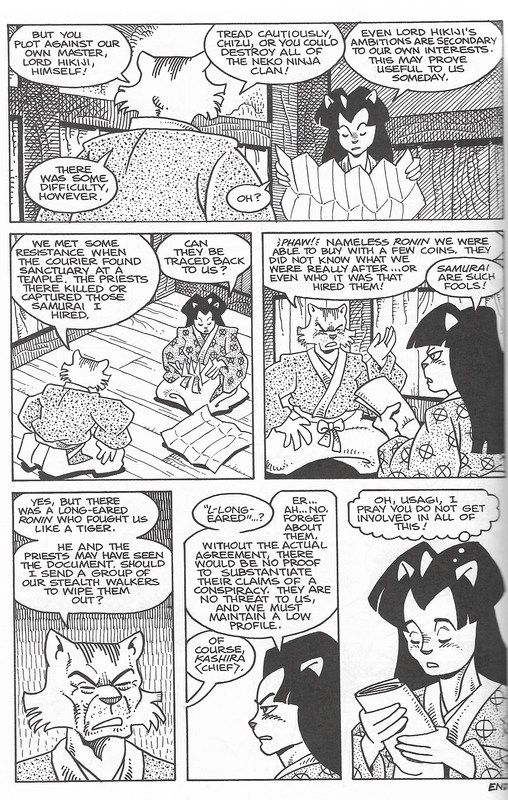 Needless to say, I think this is an excellent issue. (Note to shaxper: A Jiro) |
|
shaxper
CCF Site Custodian
Posts: 22,864
|
Post by shaxper on Jan 25, 2016 7:52:55 GMT -5
I'm a little confused as to what Usagi is doing there. He had been in the area of Sanshobo's temple and then was seen clearly going somewhere. He was cutting across a mountain and alleged the journey would take several weeks. Yet now we find him back at Sanshobo's temple. Bad weather and a harsh lesson learned about taking shortcuts in it? Well his dealings with Lord Noriyuki and his involvement in the Dragon Bellows Conspiracy have certainly made such affairs his concern in the past. Not exactly a fair summary of Usagi. He wants to kill them out of concern for what they will do if they continue living. I would hardly consider Usagi anymore "bloodthirsty" than Sanshobo. While he hasn't given up the swords (how can he when he is convinced by the bushido teachings that they are his soul?) he has no desire to use them unless absolutely necessary, walks the warrior's pilgrimage instead of serving a lord, and continually shows great respect for former samurai who have chosen a quaint life instead. We'll see him discuss his philosophy about violence a little further down the road with "A Life of Mush". More than that, he's ready to start planning ahead in ways that he never had the audacity to attempt earlier on. Now that he knows he has a stable gig with Dark Horse, and that this Usagi project is going to be a life-long thing, he's not afraid to put events in motion that won't pay off for a while yet, and he does so with both this and the previous issue. I think a better analogy for Chizu would be Talia Al Ghul. Thank you, sir. |
|
|
|
Post by coke & comics on Jan 27, 2016 1:29:12 GMT -5
"Battle of Adachigara Plain" from Usagi Yojimbo Book 4: Dragon Bellow Conspiracy (November, 1990) Reworked into "Return to Adachi Plain" from Usagi Yojimbo #10 (February, 1997) with inks by Sergio Aragonés Reprinted in Usagi Yojimbo Book 11: Seasons  Summary: Miyamoto Usagi Summary: Miyamoto Usagi revisits Adachi Plain and remembers the battle where his Lord Mifune died, the betrayal of General Toda and his confrontation with Lord Hikiji. Thoughts: I'm embarrassed to note that I've never really paid attention to Usagi's scar before. It just seems like an odd detail line. But of course, Sakai uses no unnecessary lines. And that scar has been there since the beginning. When we were reflecting last issue on Usagi's conversation with Sanshobo, about why a mendicant ronin chooses to be so involved in political affairs, that was a relevant details. Hikiji scarred him, in addition to killing his lord. Oh, and killing his father. And all the other evil things he's come across Hikiji doing. In fact, it's more of a mystery why Usagi isn't even more obsessive about bringing the battle to Hikiji. I have never seen the painted version of this story, and only have the Aragones-inked version. It's basically a recap story, so not too much more to say. Notes: Based on the conventions I've been using, this review is way late. But I missed it the first time. So now seems a good time to swing back to it. The story was originally a painted story from the original printing of the 4th Usagi collection, published in 1990. It was reworked into a black and white story for Usagi Yojimbo #10, which is where we are in the reviewing. It is presumed it fits right about here in continuity, or at least that Sakai intended it to. At some point I need a map to make sense of Usagi's wanderings and figure out what actually makes sense. It seems he has left the temple of Sanshobo and continued his wanderings. Most of the details revealed here we knew, many from the very first Usagi story, where Usagi kills the goblin that General Toda had become. The major addition is that Usagi had a confrontation with Hikiji while he was carrying Mifune's head. This reveals how he got his scar and depicts his one and only actual meeting with Hikiji. |
|
shaxper
CCF Site Custodian
Posts: 22,864
|
Post by shaxper on Jan 27, 2016 21:10:40 GMT -5
In regard to your concern about Usagi's path, I think Sakai pays a lot more attention to the characters Usagi passes and encounters than his geographical flight plan. He's a wandering ronin, after all.
However, in regard to "A Promise in the Snow," there is more that occurs between the end of that issue and the beginning of the next one. Later down in the road in "Three Seasons" (Usagi #49), we'll see that Usagi spent an undetermined amount of time working as a bodyguard for Merchant Araki after having saved him, though, sadly, Arachi turns out to be a louse with no regard for the lives of his servants, which is sad to see.
The story provides no better explanation of why Usagi ends up back at Sanshobo's temple after, but it at least serves as a reminder that Sakai is not showing us every adventure Usagi goes on. We're skipping around a bit at the author's whim.
|
|
|
|
Post by coke & comics on Jan 28, 2016 3:32:41 GMT -5
"The Crossing" from Usagi Yojimbo #10 (February, 1997) Reprinted in Usagi Yojimbo Bool 11: Seasons Summary: Jei and Keiko take a sea voyage. Thoughts: 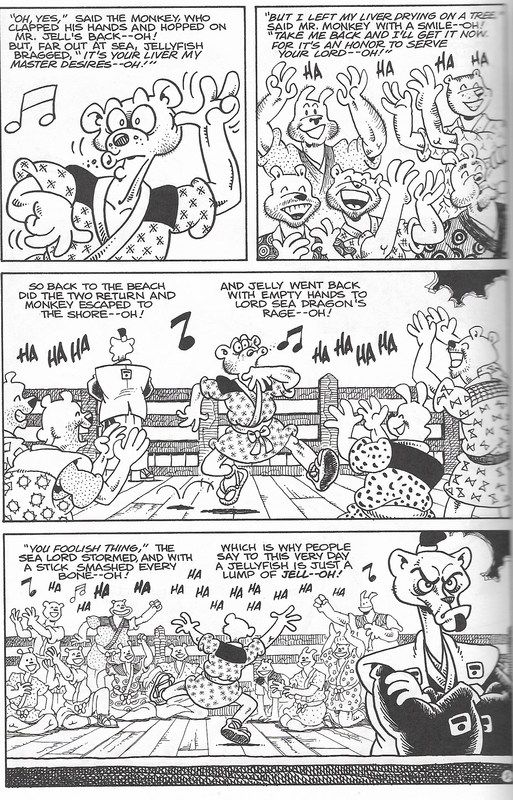 A gleeful depiction of merriment turns into a dark and ominous tale. This story picks up where issue 13 of the previous series left off and continues to build toward an inevitable rematch between Jei and Usagi. |
|
|
|
Post by coke & comics on Jan 31, 2016 0:03:29 GMT -5
"The patience of the spider" from Usagi Yojimbo #10 (February, 1997) Reprinted in Usagi Yojimbo Bool 11: Seasons Summary: Lord Araki rose against Lord Mataichi. Araki's forces were led by his cousin, General Ikeda. When Araki is killed, a soldier suggests they die with their lord, but Ikeda insists they live to take revenge against Mataichi. Ikeda is injured, but makes long term plans with Jubei and Kuroda for when they will rise again. Ikeda and Jubei will hide posing as farmers and Kuroda will be their spy in the Geishu capital. The years pass. Ikeda builds a farm; Jubei dies; Ikeda marries and has two sons; he leads farmers in battle against bandits; there were hard times, times of drought; one son died; a daughter was born. Eventually Kuroda returned to tell him that Mataichi was dead, and the child Noriyuki now ruled: that now was the time to rise. For a moment, Ikeda considered. But he refused. His life is now his family and his farm. Thoughts: The story uses a spider for a metaphor. Ikeda's lord is named Araki. Sounds very spider-like to me. Reminiscent of Arachne. Might just be a coincidence. Araki is a common Japanese name.  (The panels above sound like a superhero origin to me. Like Frank Miller's Batman. "I will become a bat.") Some of the earliest Usagi stories were characterized by the great characters we met: Tomoe, Gen, Ino, Mariko, Jotaro, and of course Spot. And the epic Dragon Bellow Conspiracy brought together all the characters we had met. Others have been introduced since, but few as timeless as Usagi's first allies. Now we are in a rash of introducing or reintroducing characters. Jei has returned. We have met Keiko. We have met Inazuma (not my favorite). We have met Koji. My favorite characters we have met recently are Sanshobo and now Ikeda. Both had short stories dedicated to telling their tales. Sanshobo's tale was like a gut punch. This is not so intense, but just as powerful. Across only 8 pages, Sakai tells the life story of Ikeda. It's filled with conflict and joy and sadness and ultimately an unexpected direction. We didn't even learn the name of Ikeda's son, but still felt the pain of his death. It's a full and rich character arc. And of course interesting for its other perspective. It's easy to think of wars as between good guys and bad guys. And just reading this story, you would have no reason to think of Ikeda's enemies on who he wants revenge as good guys. But in the context of the series, they are! His enemies are the Geishu clan, and Noriyuki, our favorite lord. Ikeda doesn't know Noriyuki. His feud against Noriyuki is inherited from Noriyuki's father, Mataichi. Mataichi we don't know as well. I think we've only met him once, in the Usagi Yojimbo color special, when we learned the story of Tomoe becoming Noriyuki's protector. But it's interesting how much we are able to empathize with a character who, in the context of the series, is an enemy. Who spent years plotting to rise against and overthrow our favorite panda lord. I am a little confused how these rebellions happened. This was an internal conflict within the Geishu province. I'm not certain how samurai reconciled that with their code of honor. They must have somehow, as these rebellions did happen. I think this is a simply great story. A great character. A great arc. A great ending. Everything. And of course with Sakai's usual masterful art and storytelling. Which is so consistent that I've taken to not mentioning it. |
|
shaxper
CCF Site Custodian
Posts: 22,864
|
Post by shaxper on Jan 31, 2016 9:34:33 GMT -5
Thoughts: The story uses a spider for a metaphor. Ikeda's lord is named Araki. Sounds very spider-like to me. Reminiscent of Arachne. Might just be a coincidence. Araki is a common Japanese name. Lord Araki will get referenced several more times after this. Merchant Araki appeared only two issues back and gets referenced as least once more as well. This confuses the heck out of me. I love when Sakai clouds loyalties and morality. In my mind, this is all practice for Duel at Kitonoji. We'll get more information about this specific rebellion later, but I don't recall it addressing your question. |
|
|
|
Post by coke & comics on Jan 31, 2016 15:53:36 GMT -5
Thoughts: The story uses a spider for a metaphor. Ikeda's lord is named Araki. Sounds very spider-like to me. Reminiscent of Arachne. Might just be a coincidence. Araki is a common Japanese name. Lord Araki will get referenced several more times after this. Merchant Araki appeared only two issues back and gets referenced as least once more as well. This confuses the heck out of me. I assume no relation. It is a common surname, googling suggests. The rebellion thing is just odd. If Mataichi was Ikeda's lord, how can Ikeda rebel and call himself a samurai? But I know this was not uncommon. Just hard to reconcile the logic. |
|

